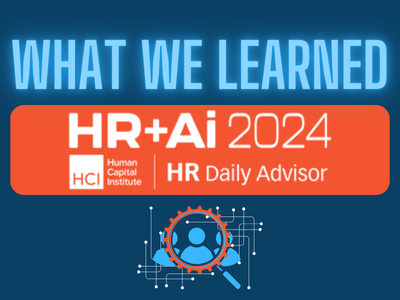HR Daily Advisor and Human Capital Institute brought together industry experts and attendees at HR+AI 2024, live in New York City on Tuesday October 22. Even if you missed these thrilling discussions on AI’s growing role in recruiting, the candidate experience, and engagement, you can still learn from the event!
AI Can Do a Lot, But Not Everything
“AI’s not going to solve all of our problems,” said Ross Mahaffey, former Director of Talent Acquisition at Uber. Instead, AI should be used to streamline pinch points in the recruiting process. When implementing AI, recruiters delegate busy work to the technology, instead focusing their efforts on getting the right people into the right roles.
Ramya Kamalanathan, Head of Technology, Valuation, and Advisory at Cushman & Wakefield, reminds leaders of the limitations of AI—at the end of the day, it cannot match the value of a human being. Like Mahaffey advised, Kamalanathan recommends using AI in the more systematic aspects of recruiting—like in automating candidate screening, identifying talent from multiple sources, and saving time and resources through automation.
Remember that AI is incredibly useful, but it can’t do everything. As David Crawford, VP of Talent Acquistion at New York-Presbyterian Hospital, said, “AI’s sort of like a smart second grader.” Final decisions are meant to be made by leaders, not technology.
Ethical AI
With that in mind, HR leaders must also ensure ethical implementation of AI in their hiring strategies. To start, Gianna Driver, Chief People Officer at Lattice, recommends creating an ethics board. Create an AI committee comprised of cross-functional business stakeholders—consider adding leaders from HR, security, IT, legal, and compliance—that meets at minimum quarterly to discuss what’s acceptable or unacceptable for AI’s role in the hiring process. Ultimately, don’t use AI to make definitive decisions, just use it to analyze data for the human to make the final decision.
With the rights checks and balances in place, you can “harness the power of AI while mitigating risks,” explains Nathaniel M. Glasser, Member of the Firm at Epstein Becker & Green, P.C..
In addition to an AI oversight board, consider looking into preexisting and upcoming laws on AI governance. The Equal Employment Opportunity Council’s countless guidelines on AI and the White House’s Blueprint for an AI Bill of Rights serve as excellent sources for leaders beginning to utilize AI. Recruiting teams can also look to state and local laws on AI, such as the Illinois AI Video interview Act, NYC Local Law 144, Colorado SB 24-205, and Illinois HB 2772 Amendments to Human Rights Act.
Stay tuned for more coverage, best practices, and strategies for AI hiring that we learned at HR + AI 2024!

